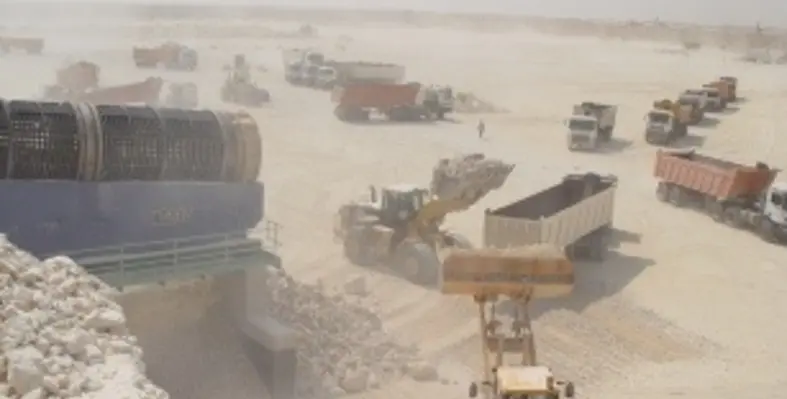A pair of heavy duty Hercules Trommels, manufactured by UK-based Stelex Construction Equipment, have been operating on a large stone project in Qatar. Stelexs Lee Fletcher writes about the operation of both machines in the desert heat
Both trommels ? model HT232 ? have a barrel diameter of 2.3 metres and are capable of a throughput of up to 1000 TPH. These are two of the largest Hercules Trommels working outside of the UK.
Working 24-hours-a-day, seven-days-a-week, the machines have been supplying clean graded rock from 1200mm sized as-dug feed material. The completed project tonnage will be in excess of 30 million tonnes in total.
Both units have been working all day without the need for any permanent operators to be in place and both machines have been positioned side-by-side in the quarry with the blasted rock being fed directly to the 160 tonne capacity trommel feed hoppers via dump trucks.
Each feed hopper has been fitted with wear resistant liner plates to help prolong the life of the machines. Underneath the hopper a reciprocating pusher-feeder moves material into the barrel via hydraulic rams that can be adjusted on the length and timing of each stroke.
The feeder table has also fitted with wear resistant liner plates. The trommels use 100mm apertures in each eight metre long barrel to remove unwanted fines material. The material produced from the end of the barrel is placed into a very large fleet of waiting lorries for delivery to the required location.
The clean graded rock will be used for the building and extension of harbours and breakwaters in the region. The aggressive ?tumbling? action of the trommel barrel as it rotates helps to effectively separate unwanted contamination or produce sized products from within the feed material.
 The barrel is supported on four steel rollers and is driven directly by two of these rollers via heavy-duty variable speed hydraulic motors. Chains are no longer used to drive the trommel barrel like they were many years ago as these were found to require lots of maintenance and were notoriously noisy.
The barrel is supported on four steel rollers and is driven directly by two of these rollers via heavy-duty variable speed hydraulic motors. Chains are no longer used to drive the trommel barrel like they were many years ago as these were found to require lots of maintenance and were notoriously noisy.
The trommels have been mounted on concrete walls and supplied with access platforms for safe routine inspections. The barrel rotation speeds and feeder strokes were adjusted to suit the exact requirements of the customer and the type of feed material being screened.
This was easily done by the custom-built electric/hydraulic powerpacks supplied as part of the project. The powerpacks were positioned remotely away from the trommels and the specification of the powerpacks was designed to operate in temperatures up to 50?C.
Restrictions on the opening of new quarries and the further development of existing sites has meant that matching production levels to the demand has become a challenging balancing act. As demand for good quality clean or sized stone increases, quarry operators have been looking to maximise on their precious existing quarry reserves.
Some companies have also been looking at the often vast hidden reserves of waste that were created by previous quarry development work. All of this means that Hercules trommels will continue to play a major role in a wide range of applications worldwide and Stelex has been helping customers reach their environmental aims for the future.






